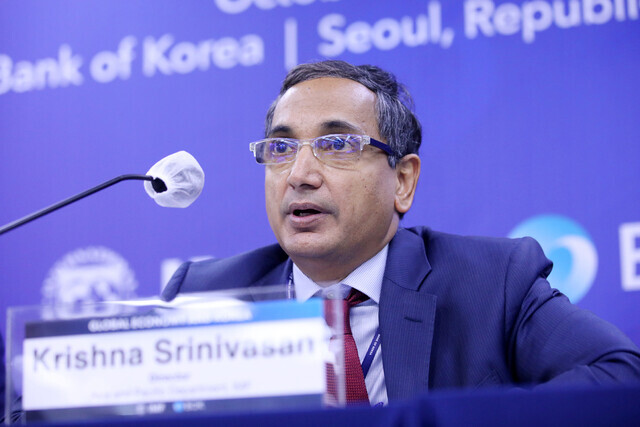hankyoreh
Links to other country sites 다른 나라 사이트 링크
IMF official calls S. Korea’s fundamentals “strong,” while warning of government debt

Krishna Srinivasan, the director of the International Monetary Fund’s (IMF) Asia and Pacific Department, predicted that the South Korean economy’s “strong fundamentals” will play a buffer role even amid a downturn in the global economy.
At the same time, he voiced “concerns” about the increase in government debt over the past few years and advised Seoul to establish stronger regulations for fiscal management going forward.
On Tuesday, Srinivasan visited the Bank of Korea (BOK) press center to speak about the current economic situation and prospects in Asia and South Korea.
At the start of his presentation, he noted that three major risk factors for Asian economies have all become a reality with the retrenchment of financial conditions, the war in Ukraine, and the unprecedented steep slowdown in China’s economic growth. He also said the South Korean economy was expected to face stagnant exports next year as a consequence.
But even in this difficult environment, the South Korean economy’s strong fundamentals will play a buffer role, he said.
Predicting that South Korea would continue to show a current account surplus amid the worsening trade conditions, he noted that its net foreign assets amounted to 40% of gross domestic product (GDP), while its foreign reserves totaled 25% of GDP, or three times its short-term liabilities.
Commenting on the worsening current account balance as energy import prices rise, he said South Korea’s resilience could be observed in the current account conditions outside of the energy sector.
But Srinivasan also voiced concerns about the rate at which South Korea’s government debt has been growing.
Stressing that debt was the only area where he felt some concerns, he observed that South Korea’s public debt has been rising at a steep rate recently and currently amounts to around 55% of GDP. He underscored the importance of establishing a stronger “anchor” for fiscal targets, such as ensuring that public debt does not exceed 60% of GDP.
“It's important that fiscal policy complements monetary policy, even while providing support to the people who need it most,” he said, stressing that fiscal policy should be “budget neutral.”
Citing the UK’s tax cut policies as an example, he emphasized the importance of establishing a medium- to long-term plan for fiscal management.
Observing that the UK has not yet announced its framework for medium- to long-term fiscal management, he predicted that this situation could cause people to feel uneasy amid predictions of changes to government expenditures and revenues.
By Lee Jae-yeon, staff reporter
Please direct questions or comments to [english@hani.co.kr]

Editorial・opinion
![[Editorial] Intensifying US-China rivalry means Seoul must address uncertainty with Beijing sooner than later [Editorial] Intensifying US-China rivalry means Seoul must address uncertainty with Beijing sooner than later](https://flexible.img.hani.co.kr/flexible/normal/500/300/imgdb/original/2024/0517/8117159322045222.jpg) [Editorial] Intensifying US-China rivalry means Seoul must address uncertainty with Beijing sooner than later
[Editorial] Intensifying US-China rivalry means Seoul must address uncertainty with Beijing sooner than later![[Column] When ‘fairness’ means hate and violence [Column] When ‘fairness’ means hate and violence](https://flexible.img.hani.co.kr/flexible/normal/500/300/imgdb/original/2024/0516/7417158465908824.jpg) [Column] When ‘fairness’ means hate and violence
[Column] When ‘fairness’ means hate and violence- [Editorial] Yoon must stop abusing authority to shield himself from investigation
- [Column] US troop withdrawal from Korea could be the Acheson Line all over
- [Column] How to win back readers who’ve turned to YouTube for news
- [Column] Welcome to the president’s pity party
- [Editorial] Korea must respond firmly to Japan’s attempt to usurp Line
- [Editorial] Transfers of prosecutors investigating Korea’s first lady send chilling message
- [Column] Will Seoul’s ties with Moscow really recover on their own?
- [Column] Samsung’s ‘lost decade’ and Lee Jae-yong’s mismatched chopsticks
Most viewed articles
- 1Celine Song says she’s gratified global audiences have responded to the kismet of ‘inyeon’
- 2[Editorial] Transfers of prosecutors investigating Korea’s first lady send chilling message
- 3[Exclusive] Unearthed memo suggests Gwangju Uprising missing may have been cremated
- 4Xi, Putin ‘oppose acts of military intimidation’ against N. Korea by US in joint statement
- 5For new generation of Chinese artists, discontent is disobedience
- 6[Column] US troop withdrawal from Korea could be the Acheson Line all over
- 7Highly educated high-earners at risk of being replaced by AI, BOK study says
- 8Could Korea’s Naver lose control of Line to Japan?
- 9Japan begins dumping irradiated Fukushima water amid outpouring of concern about vague timeline
- 10Yoon ridicules critics of Fukushima dumping in first comments since release began